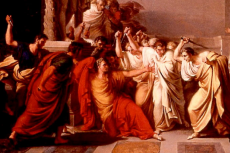
To attribute one sole motive to the assassination of Caesar without considering all possibilities would be a great simplification of what is ultimately a complex state of affairs. Ambitious and arrogant, Caesar accumulated numerous enemies over his career, many of who might have wished him dead for a variety of reasons. The visual imagery of Caesar falling dead ‘with 23 wounds’ effectively portrays that his assassins did not have one unanimous reason for murdering him. The common belief established through millennia that is still agreed upon by such modern scholars as John Buchan, Christian Meier and M.L.Clarke, is that Caesar’s sense of hubris grew so great that he began to act as Rex, utterly undermining the foundations the Republic had been built upon, and that is why he had to die. Clarke even hails Marcus Brutus in particular as ‘The Noblest Roman’ for ridding the Republic of the tyrannical monarch, Caesar. However, in his recent book ‘The Assassination of Julius Caesar: A People's History of Ancient Rome’, Michael Parenti is leading a new school of thought, suggesting that the main motive behind Caesar’s assassination, as with many murdered reformers of the Republic, is that he threatened the personal prestige of Roman nobles. By reigning as sole dictator and increasing the number of Quaestors and Praetors Caesar had removed that Roman noble sense of competition for Dignitas and Gloria and in fact that is why he had to die. These two compelling arguments no doubt both have merit and that only lends further support to the conclusion that there is no sole reason for Caesar’s assassination. This paper will therefore, in consideration of the number of senators prepared to murder Caesar and paying careful attention to primary source material, argue that although one sole motive cannot explain Caesar’s assassination, if one may be given greater weight above all others it is the latter theory that he impeded the Roman nobility’s ability to compete for Dignitas and Gloria, so had to die.

Although we are more knowledgeable of the fall of Caesar and the Republic than any previous years in the Roman Republic, a large majority of what is known was written by Caesar himself, which is both problematic and advantageous. Far from being useless the obvious bias of Caesar’s Gallic War and The Civil War provide an insight into his perspective on events. Indeed the fact that he narrates in third person is intriguing and we might ascertain that this was a deliberate method employed to reiterate his name throughout history books and create a lasting legacy to record his greatness. Ultimately it worked as he was deified post mortem. The main disadvantage of Caesar as narrator is that his overwhelming pride and arrogance meant that he may have overlooked conspirators, assuming himself to be untouchable. Indeed it was for his pride that he listened to Decimus Brutus and attended the Senate meeting on the Ides of March, ignoring multiple warnings. Let us be clear at this point that both Marcus Junius Brutus and Decimus Junius Brutus Albinus were involved in the plot to assassinate Caesar, though Marcus Brutus is considered to have played a greater role of leadership alongside Gaius Cassius Longinus whilst Decimus Brutus dined with Caesar the previous night and was sent to convince Caesar to attend the senate after he at first did not come and then to distract Mark Antony in conversation also. Cicero is our only other contemporary source though he did not write histories as such as much as he did letters to friends. Perhaps most useful therefore are his letters to Cassius and Brutus, leaders of the plot to assassinate Caesar, which interestingly lend more to Parenti’s new theory than that of Caesar as king, which will be discussed in more depth later and will contribute greatly to the overall conclusion. Though he supported Cassius and Brutus in their apparent cause of liberating the Republic, Cicero, who perhaps is most deserving of the title ‘the noblest of Romans’ was not informed of the plot to kill Caesar, indeed his face is described as ‘ashen’ in response to the murder. Cicero always fell on the side of morality and so because he did not approve of Caesar’s murder to ‘liberate the Republic’, we might conclude that the real motives for the assassins were more personal and bitter so his work will be of great use in this paper.
IMAGE 1:http://www.history.com/news/wp-content/uploads/2012/10/julius-caesar-stabbing.jpg
IMAGE 2: http://www.kulthit.de/bilder/asterix-bei-den-olympischen-spielen-4.jpg

0 Comment:
Be the first one to comment on this article.